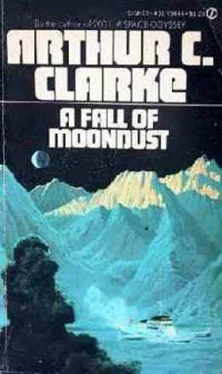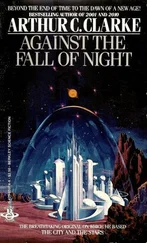Arthur Clarke - A Fall of Moondust
Здесь есть возможность читать онлайн «Arthur Clarke - A Fall of Moondust» весь текст электронной книги совершенно бесплатно (целиком полную версию без сокращений). В некоторых случаях можно слушать аудио, скачать через торрент в формате fb2 и присутствует краткое содержание. Жанр: Фантастика и фэнтези, на английском языке. Описание произведения, (предисловие) а так же отзывы посетителей доступны на портале библиотеки ЛибКат.
- Название:A Fall of Moondust
- Автор:
- Жанр:
- Год:неизвестен
- ISBN:нет данных
- Рейтинг книги:5 / 5. Голосов: 1
-
Избранное:Добавить в избранное
- Отзывы:
-
Ваша оценка:
- 100
- 1
- 2
- 3
- 4
- 5
A Fall of Moondust: краткое содержание, описание и аннотация
Предлагаем к чтению аннотацию, описание, краткое содержание или предисловие (зависит от того, что написал сам автор книги «A Fall of Moondust»). Если вы не нашли необходимую информацию о книге — напишите в комментариях, мы постараемся отыскать её.
A Fall of Moondust — читать онлайн бесплатно полную книгу (весь текст) целиком
Ниже представлен текст книги, разбитый по страницам. Система сохранения места последней прочитанной страницы, позволяет с удобством читать онлайн бесплатно книгу «A Fall of Moondust», без необходимости каждый раз заново искать на чём Вы остановились. Поставьте закладку, и сможете в любой момент перейти на страницу, на которой закончили чтение.
Интервал:
Закладка:
“A few other points. Selene is three kilometers from the nearest solid land — the Mountains of Inaccessibility. There may be several hundred meters of dust beneath her, though we're not sure of that. Nor can we be quite sure that there will be no more cave-ins, though the geologists think it's very unlikely.
“The only way we can reach the site is by dust-ski. We've two units, and another one is being shipped round from Farside. They can carry or tow up to five tons of equipment; the largest single item we could put on a sledge would be about two tons. So we can't bring any really heavy gear to the site.
“Well, that's the position. We have ninety hours. Any suggestion? I've some ideas of my own, but I'd like to hear yours first.”
There was a long silence while the members of the committee, scattered over a volume of space almost four hundred thousand kilometers across, brought their various talents to bear on the problem. Then the Chief Engineer, Farside, spoke from somewhere in the neighborhood of Joliot-Curie.
“It's my hunch that we can't do anything effective in ninety hours; we'll have to build special equipment, and that always takes time. So — we have to get an air line down to Selene. Where's her umbilical connection?”
“Behind the main entrance, at the rear. I don't see how you can get a line there and couple it up, fifteen meters down. Besides, everything will be clogged with dust.”
“I've a better idea”, someone interjected. “Drive a pipe down through the roof.”
“You'll need two pipes”, pointed out another speaker. “One to pump in oxygen, the other to suck out the foul air.”
“That means using a complete air purifier. And we won't even need it if we can get those people out inside the ninety hours.”
“Too big a gamble. Once the air supply is secure, we can take our time, and the ninety-hour deadline won't worry us.”
“I accept that point”, said Lawrence. “In fact, I've several men working on those lines right now. The next question is: Do we try to raise the cruiser with everyone inside, or do we get the passengers out individually? Remember, there's only one space suit aboard her.”
“Could we sink a shaft to the door, and couple it to the air lock?” asked one of the scientists.
“Same problem as with the air hose. Even worse, in fact, since the coupling would be so much bigger.”
“What about a cofferdam large enough to go round the whole cruiser? We could sink it round her, then dig out the dust.”
“You'd need tons of piles and shorings. And don't forget, the dam would have to be sealed off at the bottom. Otherwise the dust would flow back into it, just as fast as we took it out of the top.”
“Can you pump the stuff?” asked someone else.
“Yes, with the right kind of impeller. But you can't suck it, of course. It has to be lifted. A normal pump just cavitates.”
“This dust”, grumbled the Port Roris Assistant Engineer, “has the worst properties of solids and liquids, with none of their advantages. It won't flow when you want it to; it won't stay put when you want it to.”
“Can I make a point?” said Father Ferraro, speaking from Plato. “This word 'dust' is highly misleading. What we have here is a substance that can't exist on Earth, so there's no name for it in our language. The last speaker was quite correct; sometimes you have to think of it as a nonwetting liquid, rather like mercury, but much lighter. At other times, it's a flowing solid, like pitch — except that it moves much more rapidly, of course.”
“Any way it can be stabilized?” someone asked.
“I think that's a question for Earth”, said Lawrence. “Doctor Evans, would you like to comment?”
Everyone waited for the three seconds, which, as always, seemed very much longer. Then the physicist answered, quite as clearly as if he were in the same room: “I've been wondering about that. There might be organic binders — glue, if you like — that would make it stick together so that it could be handled more easily. Would plain water be any use? Have you tried that?”
“No, but we will”, answered Lawrence, scribbling a note.
“Is the stuff magnetic?” asked the Traffic Control Officer.
“That's a good point”, said Lawrence. “Is it, Father?”
“Slightly; it contains a fair amount of meteoric iron. But I don't think that helps us at all. A magnetic field would pull out the ferrous material, but it wouldn't affect the dust as a whole.”
“Anyway, we'll try.” Lawrence made another note. It was his hope — though a faint one — that out of this clash of minds would come some bright idea, some apparently farfetched but fundamentally sound conception that would solve his problem. And it was his, whether he liked it or not. He was responsible, through his various deputies and departments, for every piece of technical equipment on this side of the Moon — especially when something went wrong with it.
“I'm very much afraid”, said the Clavius Traffic Control Officer, “that your biggest headache will be logistics. Every piece of equipment has to be ferried out on the skis, and they take at least two hours for the round trip — more, if they're towing a heavy load. Before you even start operating, you'll have to build some kind of working platform — like a raft — that you can leave on the site. It may take a day to get that in position, and much longer to get all your equipment out to it.”
“Including temporary living quarters”, added someone. “The workmen will have to stay on the site.”
“That's straightforward; as soon as we fix a raft, we can inflate an igloo on it.”
“Better than that; you won't even need a raft. An igloo will float by itself.”
“Getting back to this raft”, said Lawrence, “we want strong, collapsible units that can be bolted together on the site. Any ideas?”
“Empty fuel tanks?”
“Too big and fragile. Maybe Tech Stores has something.”
So it went on; the brain trust was in session. Lawrence would give it another half-hour, then he would decide on his plan of action.
One could not spend too much time talking, when the minutes were ticking away and many lives were at stake. Yet hasty and ill-conceived schemes were worse than useless, for they would absorb materials and skills that might tilt the balance between failure and success.
At first sight, it seemed such a straightforward job. There was Selene, within a hundred kilometers of a well-equipped base. Her position was known exactly, and she was only fifteen meters down. But that fifteen meters presented Lawrence with some of the most baffling problems of his entire career.
It was a career which, he knew well, might soon terminate abruptly. For it would be very hard to explain his failure if those twenty-two men and women died.
It was a great pity that not a single witness saw Auriga coming down, for it was a glorious sight. A spaceship landing or taking off is one of the most impressive spectacles that Man has yet contrived — excluding some of the more exuberant efforts of the nuclear engineers. And when it occurs on the Moon, in slow motion and uncanny silence, it has a dreamlike quality which no one who has seen it can ever forget.
Captain Anson saw no point in trying any fancy navigation, especially since someone else was paying for the gas. There was nothing in the Master's Handbook about flying a space liner a hundred kilometers — a hundred kilometers, indeed! — though no doubt the mathematicians would be delighted to work out a trajectory, based on the Calculus of Variations, using the very minimum amount of fuel. Anson simply blasted straight up for a thousand kilometers (this qualifying for deep-space rates under Interplanetary Law, though he would tell Spenser about this later) and came down again on a normal vertical approach, with final radar guidance. The ship's computer and the radar monitored each other, and both were monitored by Captain Anson. Any one of the three could have done the job, so it was really quite simple and safe, though it did not look it.
Читать дальшеИнтервал:
Закладка:
Похожие книги на «A Fall of Moondust»
Представляем Вашему вниманию похожие книги на «A Fall of Moondust» списком для выбора. Мы отобрали схожую по названию и смыслу литературу в надежде предоставить читателям больше вариантов отыскать новые, интересные, ещё непрочитанные произведения.
Обсуждение, отзывы о книге «A Fall of Moondust» и просто собственные мнения читателей. Оставьте ваши комментарии, напишите, что Вы думаете о произведении, его смысле или главных героях. Укажите что конкретно понравилось, а что нет, и почему Вы так считаете.












